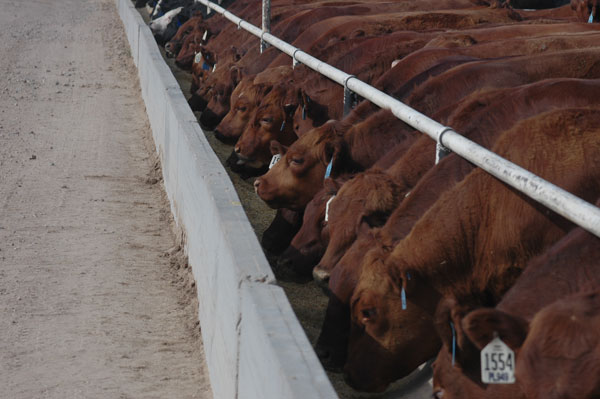Will Grassley’s bill save the cash market for fed cattle?
Proposed legislation requires 50% of fed cattle be bought on the cash market.
May 21, 2020

Sen. Charles Grassley (R-IA) recently proposed legislation to mandate most packing plants to procure at least 50% of their harvest needs from negotiated cash deals. The question now before the beef business is this: Is mandating the level of packer involvement in the cash market good or bad?
A key complaint in the current furor over cattle and beef markets is the “disconnect” between futures prices and cash prices. Then there was soaring boxed beef prices. If you’ll remember, that was also a point of contention following the fire at the Tyson beef plant in Holcomb, Kan.
There are some problems with that reasoning.
First, futures contracts are not a direct reflection of supply and demand in the cattle market. They are investor vehicles and they take into account many more factors beyond fed cattle supply and demand, including all kinds of market psychology. Then there’s the lure of competing commodities, real estate, T-bills and alternative investments; the degree of investor liquidity; etc.
Coronavirus gave us an extreme example. When it hit, the investor herd ran like spooked horses. They got out of about everything but gold, as worldwide upheaval put fear and doubt into anyone protecting their money. That was rational and understandable.
If investors hadn’t reacted to some extent, it would be a sign that markets were not responsive to the real world.
After the Tyson fire and the coronavirus disaster, the markets quickly responded to shuttered packing plants, as Colorado State economist Stephen Koontz pointed out. Plant capacity dictates the beef supply to groceries and foodservice, and therefore, cash flow to packers and back to cattlemen.
Some folks react to these situations with calls for abolishing the futures. It was so in the 1970s. It is so today.
The problem is, that would cut off cattlemen and the rest of the beef industry from a huge pool of capital that provides opportunity and protection for the industry, most of the time. Is it wise to throw the baby out with the bath water because some of the time it doesn’t work the way we want? The ability to hedge cattle much of the time is a critical enabling factor in many folks being able or willing to feed cattle at all—or their bankers to allow them to.
Government help?
The response by some to the most disruptive occurrences in beef marketing history in just the last year has been to run to the government for fixing.
So, next question. Can the government fix the cash market? Related question: Why does the cash market need fixing?
The cash market has become so thin because the alternatives have worked better for more and more cattlemen. The use of the cash market has not declined because it is the best avenue for all cattlemen to use and its use has been banned.
Which brings us to Sen. Grassley’s proposed legislation to mandate most packing plants procure at least 50% of their harvest needs from negotiated cash deals. The text of this particular bill’s version has not been released. But Grassley’s not shy in explaining that he’s introduced this type of legislation for nearly 20 years.
Startlingly, the 2002 version has a clause requiring a plant not to average 25% of harvest over the year or a quarter or a month. It required a plant to source 25% of its capacity every day!
That couldn’t be anything but a production nightmare. Imagine being told you couldn’t ship cattle on the day planned because some other loads hadn’t come in and the percentage would be off. Enforcement and penalties were not spelled out.
More to the point, what would happen if there weren’t enough cattle out there that could be bought for cash? What about feeders who preferred selling on a formula? Is there going to be a waiting list for feeders not wanting to sell cash but without a contract slot because of federal law?
Never mentioned in arguments we read is the competition to get cattle under some kind of agreement. If all the buyers in an area know certain pens have been placed that have graded high and yielded high in the past, do they all sit around waiting for some other packer buyer to snap them up? What kind of business, say an assembly line manufacturer, must comply with federal laws specifying how it can procure parts?
Long term, the most disturbing features of legislation like this are the total disregard for incentive and for consumers/taxpayers/citizen wishes. A key reason consumers snatched up more beef than normal and emptied meat cases early on in the coronavirus panic was the quality and consistency of today’s beef.
Selling on the cash market, on the average with only guesses as to the carcass grade and cutability, brought the beef industry to its knees in the ‘80s. Packers were buying a “pig in a poke.” Consumers were playing Russian roulette. One of four steaks was rated not tender or flavorful.
Every year the industry was selling less beef for lower prices. Why would we want to go back to those trying times? There are other ways to improve the cash market without putting demand for beef at risk.
In Grassley’s old bill, there were references to “captive supply.” I have always regarded that as a disingenuous term of indictment. If a person signs an employment contract with a company, is he/she a “captive?” If a parts manufacturer signs a supply agreement with a car maker, is that company a “captive?” Yet, somehow, if a feeder signs an agreement with a packer, those cattle are “captive?”
Such legislation would increase packers’ costs, create scheduling problems for both packers and feeders and decrease efficiency at each plant. One might recall that MPR data showed that bigger, more efficient plants could and did pay more for cattle, as their margins were better.
Good businessmen realize that increasing costs for a buyer of one’s product leaves less for the seller to capture. The skeptics say the packers would not pay more but competition, the pressures of operating near capacity to make money and the MPR data contradict those claims.
Using the most cataclysmic and historically unprecedented events to demonize market response is surreal. Does anyone really believe packers did not want to bid up cattle and harvest more numbers and keep those retail meat cases full? Boxed beef and grinding beef went through the roof for perfectly predictable reasons. There wasn’t enough of it and nobody could fix it fast.
There was a time when cattle procurement was 100% cash. I don’t remember cattlemen being happy then either. Iowans say they sell 50% cash now—and that hasn’t solved their problems. Of course, they protest that the rest of the country gets paid more than they do, with no thanks for their service setting the cash market.
There’s no argument with the success of incentives through carcass premiums and discounts for providing more palatable beef for consumers. Today, cattle are grading 80% Choice or better—a major advance from few years ago—and Prime is 3-4 times higher than recent decades.
So, the question is, are cattlemen in different regions and different distances from big plants getting paid equivalently. The answer is likely no. But hammering both packers and feeders with a heavy-handed, one-size-fits-all government sledgehammer is not going to improve things.
I have always described our beef economy as a pyramid, with the consumer at the top and all the industry segments below, competing and cooperating to serve the consumer. That consumer is our only source of revenue. We—and Sen. Grassley—must not forget the goose that laid the golden egg.
Steve Dittmer is a longtime beef industry commentator and executive vice president of the Agribusiness Freedom Foundation. The opinions of the author are not necessarily those of beefmagazine.com or Farm Progress.
About the Author(s)
You May Also Like




.png?width=300&auto=webp&quality=80&disable=upscale)
